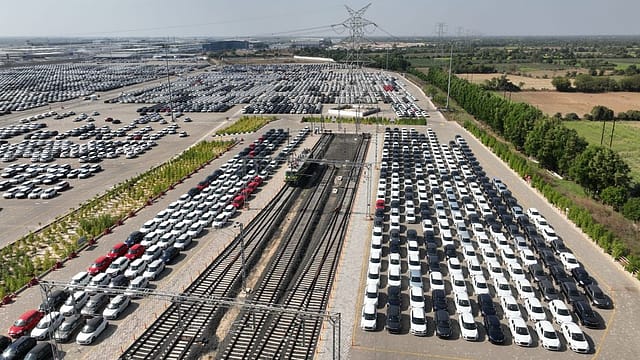Maruti Suzuki dispatches over five lakh vehicles via Indian Railways in FY25, sets green logistics record
ADVERTISEMENT

Maruti Suzuki India Limited , the country’s largest carmaker, has dispatched over 5.18 lakh vehicles via Indian Railways in FY 2024–25 — its highest-ever rail dispatches in a single financial year, making a significant leap towards sustainable logistics. The move marks a substantial boost to the company’s green logistics agenda and sets a benchmark in India’s automotive supply chain transformation.
According to the company, nearly 25% of its total dispatches for the fiscal year were carried out through railways, enabling it to avoid more than 1.8 lakh tonnes of CO₂ equivalent emissions and save over 63 million litres of fuel. These figures are in line with the Global Logistics Emissions Council (GLEC) framework, now adopted by Maruti Suzuki for reporting logistics-related emissions.
“Reducing carbon emissions is a top priority for us, both in our products and in our operations,” said Hisashi Takeuchi, MD and CEO of Maruti Suzuki. “By FY 2030–31, we aim to increase the share of railway dispatches to 35%.”
Since FY 2014–15, the company’s rail dispatch volumes have grown nearly eightfold, with over 2.4 million vehicles transported cumulatively via railways to date. In 2013, Maruti Suzuki became the first Indian automaker to obtain the Automobile-Freight-Train-Operator (AFTO) licence — a key enabler of this initiative.
January 2026
Netflix, which has been in India for a decade, has successfully struck a balance between high-class premium content and pricing that attracts a range of customers. Find out how the U.S. streaming giant evolved in India, plus an exclusive interview with CEO Ted Sarandos. Also read about the Best Investments for 2026, and how rising growth and easing inflation will come in handy for finance minister Nirmala Sitharaman as she prepares Budget 2026.
The company’s dedicated efforts to expand its green logistics infrastructure have also seen the commissioning of India’s first in-plant railway siding at its Gujarat manufacturing facility. This milestone, inaugurated by Prime Minister Narendra Modi in 2024, has further streamlined dispatches to key export ports like Mundra and Pipavav.
Currently, Maruti Suzuki operates over 40 “flexi deck” rakes — each capable of carrying approximately 300 vehicles per trip — serving more than 600 cities from over 20 hubs across India.
With a tepid domestic sales outlook for the fiscal year, Maruti Suzuki is doubling down on exports to mitigate the impact of slow domestic sales. It plans to increase its exports by 20% in the current financial year. It has recently started exporting to Japan, where it has been seeing a healthy demand for the Fronx and the Jimny, and is currently the second-largest exporter in the country.
“Some of the major countries that we export to include Saudi Arabia, Chile, Japan, and Mexico. Our exports in May had jumped 80% year-on-year, and including April exports, it grew 50% year-on-year,” said Rahul Bharti, senior executive director, corporate affairs, Maruti Suzuki, at the company’s presser after announcing its sales for May.
As India's largest carmaker moves toward its 2030 sustainability goals, its rail-first logistics strategy offers a replicable model for reducing road congestion, fossil fuel use, and the overall carbon footprint of the automotive sector.
